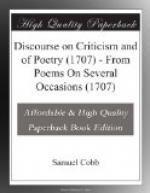Horace, who was as great a Master of Judgment, as he was an Instance of Wit, would have laid the Errours of an establish’d Writer on a pardonable Want of Care, or excus’d them by the Infirmity of Human Nature; he would have wondred at the corrupt Palates now a-days, who quarrel with their Meat, when the Fault is in their Taste. To reform which, if our Moderns would lay aside the malicious Grin and drolling Sneer, the Passions and Prejudices to Persons and Circumstances, we should have better Poems, and juster Criticisms. Nothing casts a greater Cloud on the Judgment than the Inclination (or rather Resolution) to praise or condemn, before we see the Object. The Rich and the Great lay a Trap for Fame, and have always a numerous Crowd of servile Dependants, to clap their Play, or admire their Poem.
For noble Scriblers are with Flattery
fed,
And none dare tell their Fault who eat their Bread.
Dryden’s Pers..
Juvenal shews his Aversion to this Prepossession, when his old disgusted Friend gives this among the rest of his Reasons why he left the Town,
—Mentiri
nescio: librum
Si malus est, nequeo laudare & poscere.
To conquer Prejudice is the part of a Philosopher; and to discern a Beauty is an Argument of good Sense and Sagacity; and to find a Fault with Allowances for human Frailty, is the Property of a Gentleman.
Who then is this Critick? You will find him in Quintilius Varus, of Cremona, who when any Author shew’d him his Composure, laid aside the Fastus common to our supercilious Readers; and when he happen’d on any Mistake, Corrige sodes Hoc aiebat & hoc.
Such is the Critick I would find, and such would I prove my self to others. I am sorry I must go into my Enemies Country to find out another like him. Our English Criticks having taken away a great deal from the Value of their Judgment, by dashing it with some splenetick Reflections. Like a certain Nobleman mention’d by my Lord Verulam, who when he invited any Friends to Dinner, always gave a disrelish to the Entertaiment by some cutting malicious Jest.
The French then seem to me to have a truer Taste of the ancient Authors than ever Scaliger or Heinsius could pretend to. Rapin, and above all, Bossu, have done more Justice to Homer and to Virgil, to Livy and Thucydides, to Demosthenes and to Cicero, _&c. and have bin more beneficial to the Republick of Learning, by their nice Comparisons and Observations, than all the honest Labours of those well-meaning Men, who rummage_ musty Manuscripts for various Lections. They did not Insistere in ipso cortice, verbisq; interpretandis intenti nihil ultra petere, (As Dacier has it) but search’d the inmost Recesses, open’d their Mysteries, and (as it were) call’d the Spirit




